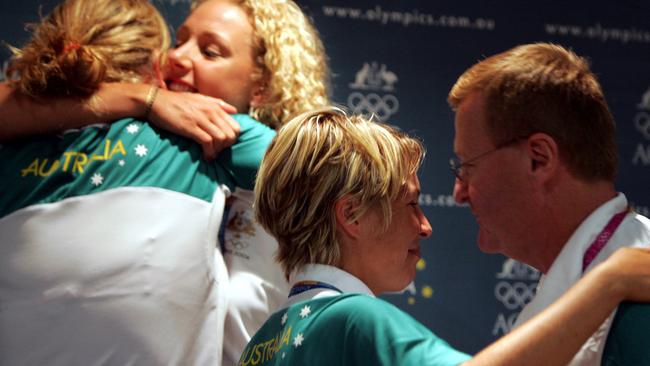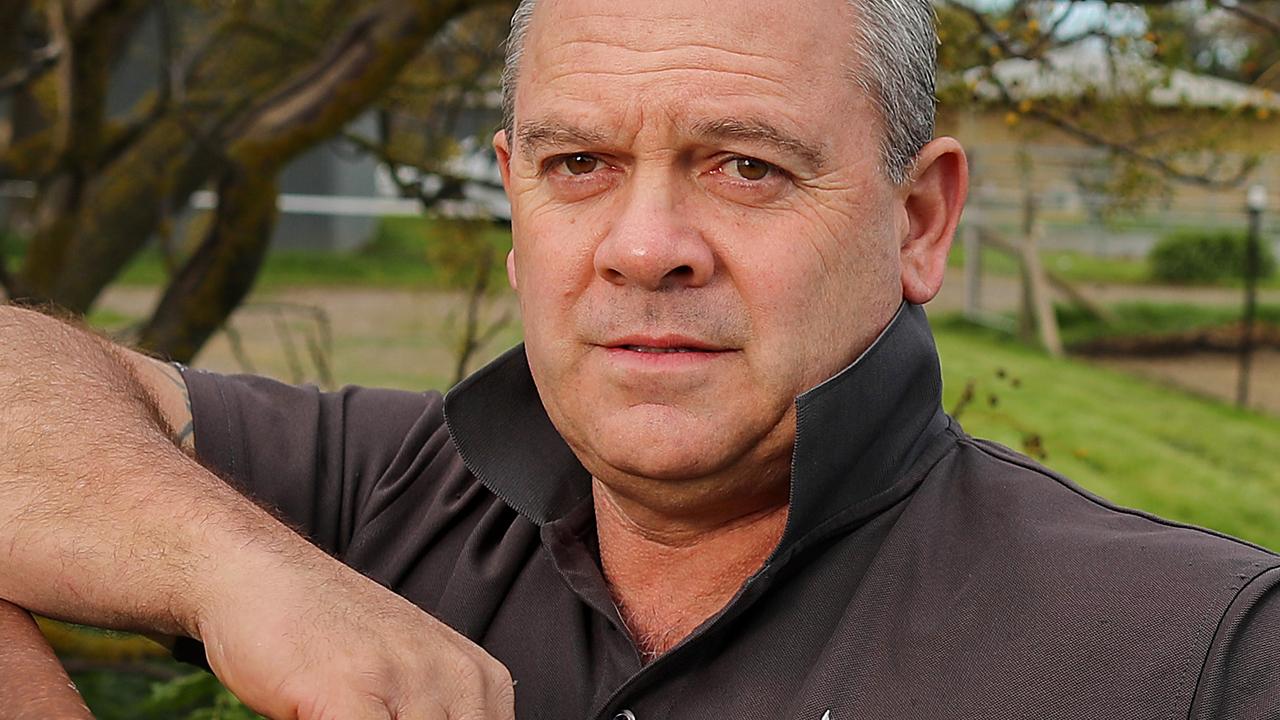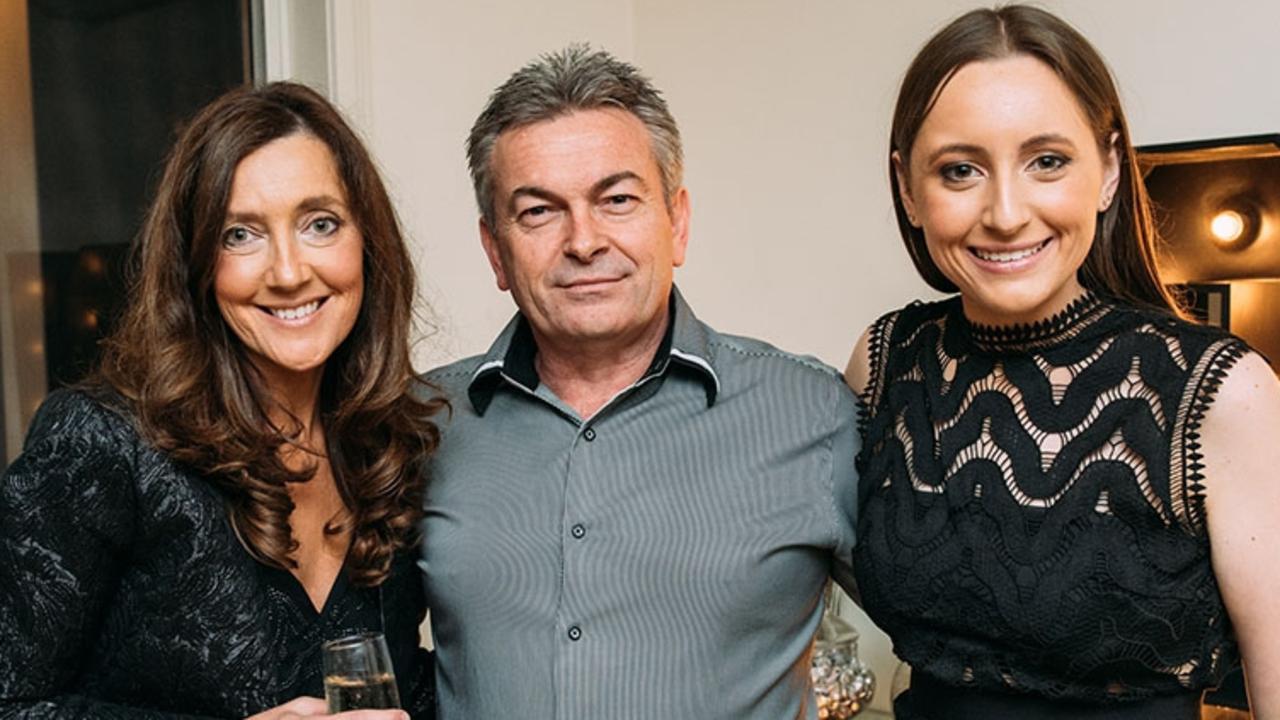Andrew Rule: Is John Coates still a good fit?
IT’S unlikely there will be any backward steps in the power struggle that is rocking Australia’s Olympic movement, writes Andrew Rule.

“IT’S HARD to be number one standover man in town when you’ve got a piece bitten out of your ear,” a seasoned defence lawyer once said of a hard-bitten Melbourne gunman shot dead by two rather severe critics after he lost the mouthful of ear — and his mojo — in a pub brawl.
WHY DANNI ROCHE CHALLENGED JOHN COATES’ OLYMPIC COMMITTEE PRESIDENCY
Olympic supremo John Coates is not a gunslinger but he is quick on the draw and rarely dodges a showdown. Coates has played on his hardman reputation longer than most Olympic competitors have been alive — proof that a schoolboy cricketer turned average rowing cox can reach one of world sport’s highest offices via the back stairs.
The downside of always being ready to rumble is that he has made plenty of enemies on his way up. Now they are waiting for him to come down, their baseball bats ready.
Still, it’s been quite a ride for the wily Sydney lawyer whose six children have probably seen more Olympic finals than Dawn Fraser.
Coates went to the Montreal Games in 1976 as a rowing official. Every four years after that he rose faster, stronger, higher in the Games hierarchy. He joined the Australian Olympic Committee in 1981 and became its president in 1990, a foothold — or stranglehold — he parlayed into membership of the powerful International Olympic Committee in 2001. In other words, Coates has been an Olympic heavyweight since Mikhail Gorbachev ran the Soviet Union, says one of his most prominent critics. Even earlier, in fact: Coates played a part in Australia not joining the Western world’s boycott of the Moscow Games in 1980 and has stayed close to the Russians.

Coates has seen off Gorby and the USSR. But even Chuck Berry and Castro didn’t last forever. Since the Rio Games, Coates has been under attack. Success has many fathers but failure is an orphan. No one wants to own Australia’s anaemic performance in Rio, all the more because pundits “went the early crow” by predicting a big medal tally. Now the nation’s Olympic powerbrokers are turning on each other — and Coates has a target painted on his back. In fact, some people have started laughing at him. The message is that JC is not the messiah, just a naughty boy — to use the famous Life of Brian line — and maybe past his use-by date.
“The best thing about Coates,” says a sporting giant close to the action, “is that he swung the deal to get the Olympics to Sydney … but the worst thing is that vote was 20 years ago.” If time now tarnishes Coates’ greatest success (based on cultivating pro-Sydney votes from African delegates through judicious awarding of special scholarships) it hasn’t made people forget his biggest failure.
In the mid-1990s, Coates and his Austrian counterpart — a casino executive — joined the Australian Olympic Committee’s investment arm, under Coates’ leadership, to invest taxpayer money in Jupiters Casino in Cairns. The cash sank almost without trace. The casino caper was an even bigger debacle than Australia’s sorry showing in Rio. Coates later characterised the loss as $3.5 million of a $7 million “investment” but people once close to him now refer meaningfully to “the Jupiters incident” or as “Coates putting millions of bucks on black”.
There’s more where that comes from. At nearly 67, Coates has been playing the Games longer than the late Juan Antonio Samaranch, whose 21 years as IOC emperor has spawned allegations of world-class cronyism and been dogged by rumours of corruption. That is not to suggest Coates would ever be involved in that sort of conduct.
“He is institutionalised and doesn’t have any other alternatives,” says a long-time observer. Referring to Coates’ controversial decision to let suspect Russian athletes compete despite widespread drug cheating, the watcher adds: “What’s the point of him being influential if he doesn’t vote in Australia’s interest?”

Coates has fallen out spectacularly with Australian Sports Commission chairman John Wylie, who has since adopted what his friends call “studied neutrality”. Wylie, and supporters such as Qantas chairman Leigh Clifford (who now heads Equestrian Australia), won’t be drawn into a slanging match with someone who has shown he relishes playing the man. Yet Coates hardly has to be painted as the Idi Amin of the Olympic movement in order to pension him off. He is more Yesterday’s Hero, which is why his public spat with Wylie — and AOC challenger Danni Roche — has the smell of last-stand desperation.
Whereas Coates once might have confidently brushed off criticism with a withering aside, he seems to be taking Roche’s tilt for his AOC president’s job very seriously indeed. The one-time hockey champ, no enemy of the Wylie camp, carries a big stick and doesn’t mince words.
Coates’ friends and enemies agree that he is a streetfighter, as Telstra found when the AOC sued it over Telstra’s deal with the Seven Network to sponsor its Olympic app.
But Roche took him on, offering to take over the AOC president’s role for no pay — compared with Coates’ eye-popping $700,000 fee — which caught the attention of people who might not otherwise give a damn which “suits” run Australian sport.
Being paid $700,000 of national sports funding when some battling sports get peanuts hardly passes the pub test. Neither does Coates’ (quite legitimate) custom of using his IOC position to invite his offspring to plum Olympic events, even if Australia doesn’t bankroll that particular perk. This was highlighted in Rio when nine Australian athletes — people who bust a gut to represent their country — were arrested and disgraced for the apparently longstanding practice of altering accreditation passes to attend finals to cheer on fellow Aussie competitors. The arrests and fines were an expensive embarrassment for the AOC, which seems to have ignored the relatively harmless practice at several Games.

BUT here’s the rub. While the nine were locked up by Brazilian police for using photocopied barcodes to get into the basketball final, three of Coates’ six adult children had good seats at the same stadium. Proof? When an alert Australian journalist asked AOC underlings if four of Coates’ children had been at the game, the indignant reply came back naming “only” three: “Paul, Phil and Fiona.” Nothing illegal but it doesn’t look good to be seen to be acting like some tinpot Third World leader. Young Phil Coates has had a great time during Dad’s president-for-life phase. Phil was the prat in the purple tie “photobombing” the Queen at the London opening ceremony. Phil the dill was sitting next to Dad behind the monarch and deliberately lowered himself into frame so a billion people could see him.
Just before those 2012 Games, this column told the story of one of our oldest former athletes, Dr John Bartram, who had run for Australia in the 1948 London Olympics.
Bartram, a natural sprinter whose career was interrupted by war service, once held every national title from 75 yards through to the 100, 220 and 440, and he ran well in three Olympic events, despite being billeted with 30 others in a school classroom. When he suggested (in 2012) that he and a couple of other 1948 veterans might be taken back to London again as “ambassadors”, Coates — the then $600,000 man — implied the AOC had better things to do with its money than spend it on old-timers and has-beens.
Now, it seems, he may be one himself.



